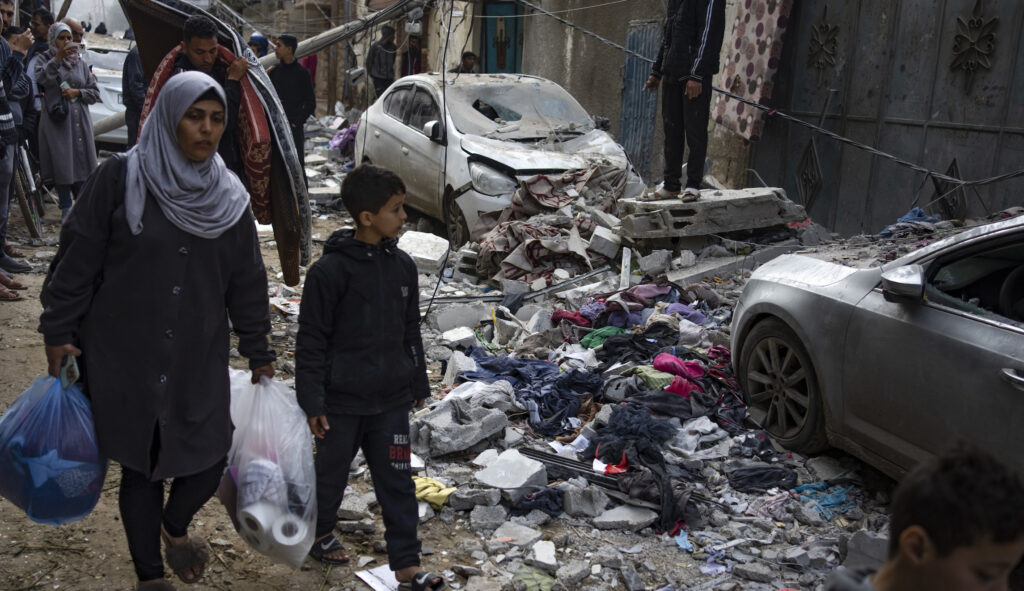Israeli Prime Minister Benjamin Netanyahu ordered the military to prepare evacuation orders for the southern Gaza city of Rafah on Friday.
The new development demonstrates Israel’s intent to carry out operations in the southern city, near Gaza’s border with Egypt, that has become a refuge for more than 1 million Palestinians who had fled from more northern parts of the enclave at Israel’s insistence, which U.S. officials have expressed concern about in recent days.
The prime minister’s office said in a statement on Friday that “it is clear that intense activity in Rafah requires that civilians evacuate the areas of combat,” so Netanyahu “has ordered the IDF and the security establishment to submit to the Cabinet a combined plan for evacuating the population and destroying the battalions.”
“It is impossible to achieve the goal of the war of eliminating Hamas by leaving four Hamas battalions in Rafah,” the statement read.
Rafah represents the last major population center Israel has yet to control, and it is where additional Hamas fighters, including senior members, are believed to be hiding and holding the hostages. Israel carried out airstrikes in Rafah overnight into Friday.
It’s unclear where the Palestinian civilians who fled south, at the orders of the Israeli military, will go and whether they will be permitted to travel north. The United States and many Arab nations in the region have previously spoken out against the forced displacement of Palestinians outside of Gaza.
Netanyahu said earlier this week that Israeli forces were preparing for operations in Rafah, which sparked international and widespread concern for the civilians who had fled to the southern Gaza city.
“I could tell you that, absent any full consideration of protecting civilians at that scale in Gaza, military operations right now would be a disaster for those people, and it’s not something that we would support,” U.S. National Security Council coordinator John Kirby said on Thursday about the possibility of Israel conducting operations in Rafah.

“I think you all know more than a million Palestinians are — are sheltering in and around Rafah. That’s where they were told to go,” he said. “There’s a lot of displaced people there. And the Israeli military has a special obligation as they conduct operations there or anywhere else to make sure that they’re factoring in protection for … innocent civilian life, particularly, you know, the civilians that were … pushed into southern Gaza by operations further north — Khan Yunis and North Gaza.”
The Biden administration has largely supported Israel’s right to respond militarily to the Oct. 7 Hamas terrorist attack that left roughly 1,200 people dead, but it has also bristled at the overwhelming death toll and destruction in Gaza. The Hamas-controlled Gaza Health Ministry has said the death toll is above 25,000, though that doesn’t distinguish between civilians and combatants.
President Joe Biden has largely avoided directly criticizing how Israel is conducting its war, but in Thursday night remarks, he described it as “over the top.”
The “conduct of the response in Gaza Strip has been over the top,” Biden said. “I’m pushing very hard now to deal with this hostage ceasefire. I’ve been working tirelessly on this deal … because I think if we can get the delay, the initial delay — I think we would be able to extend that so that we could increase the prospect that this fighting in Gaza changes.”
Israeli officials said earlier this month that roughly 10,000 Hamas fighters have been killed.
U.S. Secretary of State Antony Blinken traveled earlier this week to the Middle East, where he met with Israeli and Arab leaders with a focus on ending the conflict, securing the release of the hostages, and what happens in the aftermath of the war.
The U.S., the Qataris, and the Egyptians provided a proposal to Hamas last month, which it responded to earlier this week. The counterproposal included some “non-starters,” according to Blinken, but he said he believed all parties were making incremental progress to a new ceasefire and hostage release deal.
“We see, in what was sent back, space to continue to pursue an agreement,” the secretary said. “And these things are always negotiations. It’s not flipping a light switch. It’s not yes or no. There’s invariably back and forth. And as I said, we see the space for that.”
Hamas took roughly 240 people hostage during Oct. 7, and about 130 of them remain in Gaza. Israeli military officials reported on Tuesday that more than 30 hostages who remained in the Gaza Strip have already been killed, while another 20 others could have been killed as well.
CLICK HERE TO READ MORE FROM THE WASHINGTON EXAMINER
Netanyahu is facing international pressure to end the war due to the overwhelming toll on the Palestinians while he’s facing domestic pressure to secure the release of the remaining hostages.
The Biden administration continues to be a supporter of a two-state solution, even though Netanyahu has rebuked the idea, and it believes it is a pathway to long-term regional stability.
